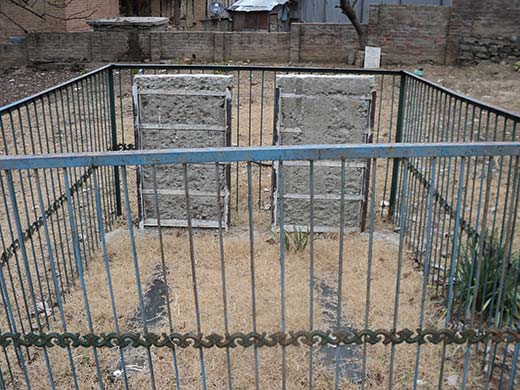
An Old Photograph of Graves of Muhib and Zakir in Panir Jagir
Dr.Mazhar
Naqvi
Panir
Jagir, a small and sleepy village of Jammu & Kashmir state, needs to find
map on the ‘Azadar World’ for being the last resting place of Mir Anis of
Baltistan Hussain Ali Muhib and his worthy
nephew and great Shair-e-Ahlebait’ Muhammad Ali Khan Zakir. The story of
the two great classic Balti poets is somewhat similar to Bahadur Shah Zafar and
Begum Hazrat Mahal. They also lie buried away from their homeland like Zafar
whose grave is in Yangon while Hazrat Mahal has her last resting place in
Kathmandu. Zafar, the last Mughal emperor, was sent to Yangon –Capital of
Myanmar by British on the charge of harboring ‘1857 Mutiny’. Hazrat Mahal
escaped deportation as the British could never capture her. After losing in
Lucknow, she took shelter in Terai forests and finally settled in Kathmandu
with the permission of Nepali King. She died in Kathmandu and lies buried in a
simple grave. While demand for bringing back the remains of Zafar is
occasionally raised, no such demand has ever been raised for the Begum. Why is it
so? The question has never been answered. Like Zafar and Hazrat Mahal, Muhib
and Zakir also belonged to the royal family. Muhib’s father Ahmad Shah was the
last independent ruler of Baltistan. While Zafar and Hazrat Mahal lived in
exile due to British, Ahmad had to leave his homeland with his family following
a Dogra invasion on Baltistan under the command of Zorawar Singh in 1840.
Dogras took Ahmad Shah, his family and two
attendants – Abdullah Ameer Khan and Murad Khan to Srinagar as war
prisoners. The Balti royals were exiled to Gomat in Jammu for nearly 3- years. Then,
they were sent to dense forests of Kishtwar. Ahmad Shah did not live long and
found dead one morning under mysterious circumstances. From Kishtwar, Dogras once
again shifted royal Baltis Sri Nagar. They started living near Hari Parbat Fort.
They also began preaching true Islam. Their growing popularity made the Dogras apprehensive
and they thought as if Baltis in exile were preparing ground for a revolt
against them. Royal Baltis received orders to leave Sri Nagar and move to Harwan.
Their simple life, generosity and knowledge earned them a large following in Harwan
also. This irked the authorities and they were finally dropped in the thick
forests of Panir Jagir with the intention to keep them in isolation. How
desolate the area was could be ascertained from the fact that only four houses
of Baltis existed in Panir Jagir till 1970.
It was isolation and hardships of life in exile that
shaped the thinking of Muhib as a marsiya writer of high caliber. His
excellence is evident from the following piece from one of his marsiyas:
“Gho been hrtane Shaqsed Pa ZiZi
Akberi Feaq poeTsan ngin eto oungse
Khsambi Migi boi leakmo de gdongpo
na rgobongpo miglam po la thongse”
(Muhib says in the stanza that mother of Ali Akbar was endlessly weeping by telling her beloved son’s gorgeous face and body seeing him through inner eyes………..Hazrat Ali was 18-year-old son of Imam Hussain and bore striking resemblance with Prophet of Islam. He was brutally martyred by Yazidi forces in Karbala).
Akberi Feaq poeTsan ngin eto oungse
Khsambi Migi boi leakmo de gdongpo
na rgobongpo miglam po la thongse”
(Muhib says in the stanza that mother of Ali Akbar was endlessly weeping by telling her beloved son’s gorgeous face and body seeing him through inner eyes………..Hazrat Ali was 18-year-old son of Imam Hussain and bore striking resemblance with Prophet of Islam. He was brutally martyred by Yazidi forces in Karbala).
Muhib also trained his nephew Zakir in the art of marsiya
composition. His death in 1895 left Zakir to keep the legacy on and he performed
his role in an exemplary manner. The craving for his lost homeland always haunted
him. Apart from creative talents, he also longed to return to his homeland like
Bahadur Shah Zafar who never forgot Delhi.
During World War
II, Zakir wrote a poem to lure Dogra King Hari Singh for securing permission to
go to Baltistan. Some lines of the poem read:
“Hai tera naam
sabzi, sar sabz hai mulk bi
Har giz khizaan
na aaye, aye nau bahaar tujhko
Ab jane de watan
mei, Maqpon ke qaidiyon ko
Jaakar waha duwa
de, leel wa nihaar tujko…”
(Your name is
everlasting, so is your kingdom
You are a new
spring, may you never face autumn!
Let exiled
prisoners return their homeland
They will pray
for you…)
But even these
‘moving’ verses couldn’t melt Maharaja’s heart. Then, he immersed himself in
elegiac poetry and died as a dejected person like Zafar in 1949.He lies buried
next to his uncle Muhib in the graveyard of Panir Jagir. Both the graves are surrounded
by an iron railing.A facelift has been given to the graves of the great poets by
Balti Welfare Society of Jammu and Kashmir as recently as in June 2015. After
lying for decades without any sign of identification, both the graves have now
tomb stone depicting their brief life history and regal past. They have also earned
the status of saints among the people of area. Indeed a blessing of Masoomeen who
repay if anyone promotes their cause. As Muhib and Zakir remembered them in
trying conditions in an unknown and unfriendly terrain, Masoomeen have blessed
them with sainthood and reverence among people from all walks of life away from
their homeland.(References available on request.Photo Courtesy Google image.)
No comments:
Post a Comment